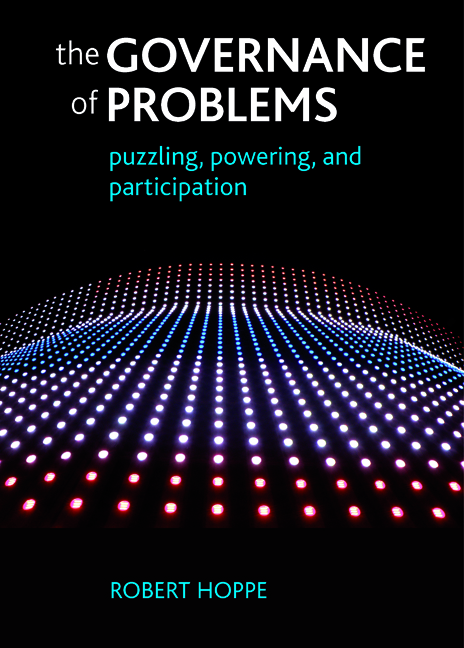Book contents
- Frontmatter
- Dedication
- Contents
- List of boxes, figures and tables
- About the author
- Preface
- one A problem-processing perspective on governance
- two The governance of problems: a map
- three Analysing policy problems: a problem-structuring approach
- four Cultures of public policy problems
- five Problem types and types of policy politics
- six Problem-structuring dynamics and meta-governance
- seven Making policy analysis doable and reflexive
- eight The plural democracies of problems: a meta-theory
- nine Public engagement and deliberative designs
- ten Responsible and hopeful governance of problems
- Bibliography
- Index
one - A problem-processing perspective on governance
Published online by Cambridge University Press: 01 September 2022
- Frontmatter
- Dedication
- Contents
- List of boxes, figures and tables
- About the author
- Preface
- one A problem-processing perspective on governance
- two The governance of problems: a map
- three Analysing policy problems: a problem-structuring approach
- four Cultures of public policy problems
- five Problem types and types of policy politics
- six Problem-structuring dynamics and meta-governance
- seven Making policy analysis doable and reflexive
- eight The plural democracies of problems: a meta-theory
- nine Public engagement and deliberative designs
- ten Responsible and hopeful governance of problems
- Bibliography
- Index
Summary
Governance of problems
People as problem processors
People are problem-processing animals. Not that we are all worrywarts, of course. But people do tend to be concerned about conditions they feel uneasy about. They brood over situations they experience as uncomfortable or troublesome, especially if they see no obvious way out. One might call this the substantive logic of problem processing: experiencing an uncomfortable situation, diagnosing the nature of the problem and figuring out what to do to solve, or at least, alleviate the problem. Most problems have a personal character; they concern people as problem owners, their families, relatives, friends, colleagues, fellow members of sports clubs and the like. How people solve problems usually remains their own business. Why bother about others, as long as satisfactory solutions can be figured out and acted on by yourself and other known people in your own household, or social circles or communities? But some of these apparently small problems may come to be seen as problems of larger scope. If your occasional backache turns out to be a serious threat to your capacity to work and earn a decent income, it helps to have a public or private health insurance system and a well-organised healthcare system.
In mobilising assistance in problem processing beyond the scope of family, household and community, people have access to two such larger systems. One is the market system, which organises and coordinates assistance through the transactions between people as buyers and sellers. The other is politics and the state, which organises and coordinates assistance through the use of multiple forms of governance that mix voluntary and compulsory forms of mutual adjustment between citizens, proximate policy makers and political decision makers. This book focuses on the latter system. But the mere use of the term ‘governance’ implies that the other forms of social coordination are far from neglected. In other words, next to a substantive logic, problem processing also has an institutional logic. For us, ordinary people, usually the substantive or provision logic is more important than the institutional logic. Yet, as will become clear throughout the rest of this book, the governance of problems at the political level entails that ‘(d)etermining the domain for market, state, family, enterprise, and civil society … is a serious task for every society, not to be disposed of by all-too-common dogma’ (Lindblom, 2001: 107).
- Type
- Chapter
- Information
- The Governance of ProblemsPuzzling, Powering and Participation, pp. 1 - 22Publisher: Bristol University PressPrint publication year: 2010

